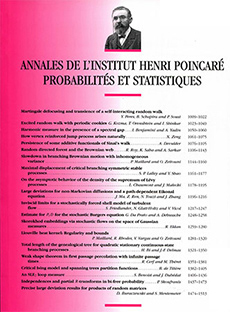Abstract
We obtain moderate deviations theorems and exponential (Bernstein type) concentration inequalities for “nonconventional” sums of the form $S_{N}=\sum_{n=1}^{N}(F(\xi_{q_{1}(n)},\xi_{q_{2}(n)},\ldots,\xi_{q_{\ell }(n)})-\bar{F})$, where most of the time we consider $q_{i}(n)=in$, but our results also hold true for more general $q_{i}(n)$’s such as polynomials. Here $\xi_{n}$, $n\geq 0$ is a sufficiently fast mixing vector process with some stationarity conditions, $F$ is a function satisfying certain regularity conditions and $\bar{F}$ is a certain centralizing constant. When $\xi_{n}$, $n\geq 0$ are independent and identically distributed a large deviations theorem was obtained in (Probab. Theory Related Fields 158 (2014) 197–224) and one of the purposes of this paper is to obtain related results in the (weakly) dependent case. Several normal approximation type results will also be derived. In particular, two more proofs of the nonconventional central limit theorem are given and a Rosenthal type inequality is obtained. Our results hold true, for instance, when $\xi_{n}=(T^{n}f_{i})_{i=1}^{\wp }$ where $T$ is a topologically mixing subshift of finite type, a Gibbs–Markov map, a hyperbolic diffeomorphism, a Young tower or an expanding transformation taken with a Gibbs invariant measure, as well as in the case when $\xi_{n}$, $n\geq 0$ forms a stationary and (stretched) exponentially fast $\phi $-mixing sequence, which, for instance, holds true when $\xi_{n}=(f_{i}(\Upsilon_{n}))_{i=1}^{\wp }$ where $\Upsilon_{n}$ is a Markov chain satisfying the Doeblin condition considered as a stationary process with respect to its invariant measure.
Nous obtenons un théorème de déviations modérées et des inégalités de concentration exponentielles (du type de Bernstein) pour des sommes «non-conventionnelles» de la forme $S_{N}=\sum_{n=1}^{N}(F(\xi_{q_{1}(n)},\xi_{q_{2}(n)},\ldots,\xi_{q_{\ell}(n)})-\bar{F})$, où la plupart du temps nous considérons $q_{i}(n)=in$, mais nos résultats restent aussi vrais pour des $q_{i}(n)$ plus généraux tels que des polynômes. Ici, $\xi_{n}$, $n\geq 0$ est un processus vectoriel suffisamment mélangeant avec des conditions de stationnarité, $F$ est une fonction satisfaisant certaines propriétés de régularité et $\bar{F}$ est une constante de centrage. Quand $\xi_{n}$, $n\geq 0$ sont indépendants et identiquement distribués, un principe de grande déviation a été obtenu dans (Probab. Theory Related Fields 158 (2014) 197–224) et un des objectifs de cet article est d’obtenir des résultats analogues dans le cas faiblement dépendant. Plusieurs résultats de type approximation normale sont aussi obtenus. En particulier, deux nouvelles preuves du théorème central limite non-conventionnel sont données et une inégalité de type Rosenthal est obtenue. Nos résultats sont vrais par exemple quand $\xi_{n}=(T^{n}f_{i})_{i=1}^{\wp}$ où $T$ est un sous-shift de type fini topologiquement mélangeant, une application Gibbs–Markov, un difféomorphisme hyperbolique, une tour de Young ou une transformation expansive pour une mesure invariante de Gibbs, tout comme dans le cas où $\xi_{n}$, $n\geq 0$ forme une suite stationnaire exponentiellement (ou streched exponentiellement) $\phi$-mélangeante, ce qui, par exemple, et vrai lorsque $\xi_{n}=(f_{i}(\Upsilon_{n}))_{i=1}^{\wp}$ où $\Upsilon_{n}$ est une chaîne de Markov satisfaisant une condition de Doeblin, considérée comme un processus stationnaire par rapport à une mesure invariante.
Citation
Yeor Hafouta. "Nonconventional moderate deviations theorems and exponential concentration inequalities." Ann. Inst. H. Poincaré Probab. Statist. 56 (1) 428 - 448, February 2020. https://doi.org/10.1214/19-AIHP967
Information





